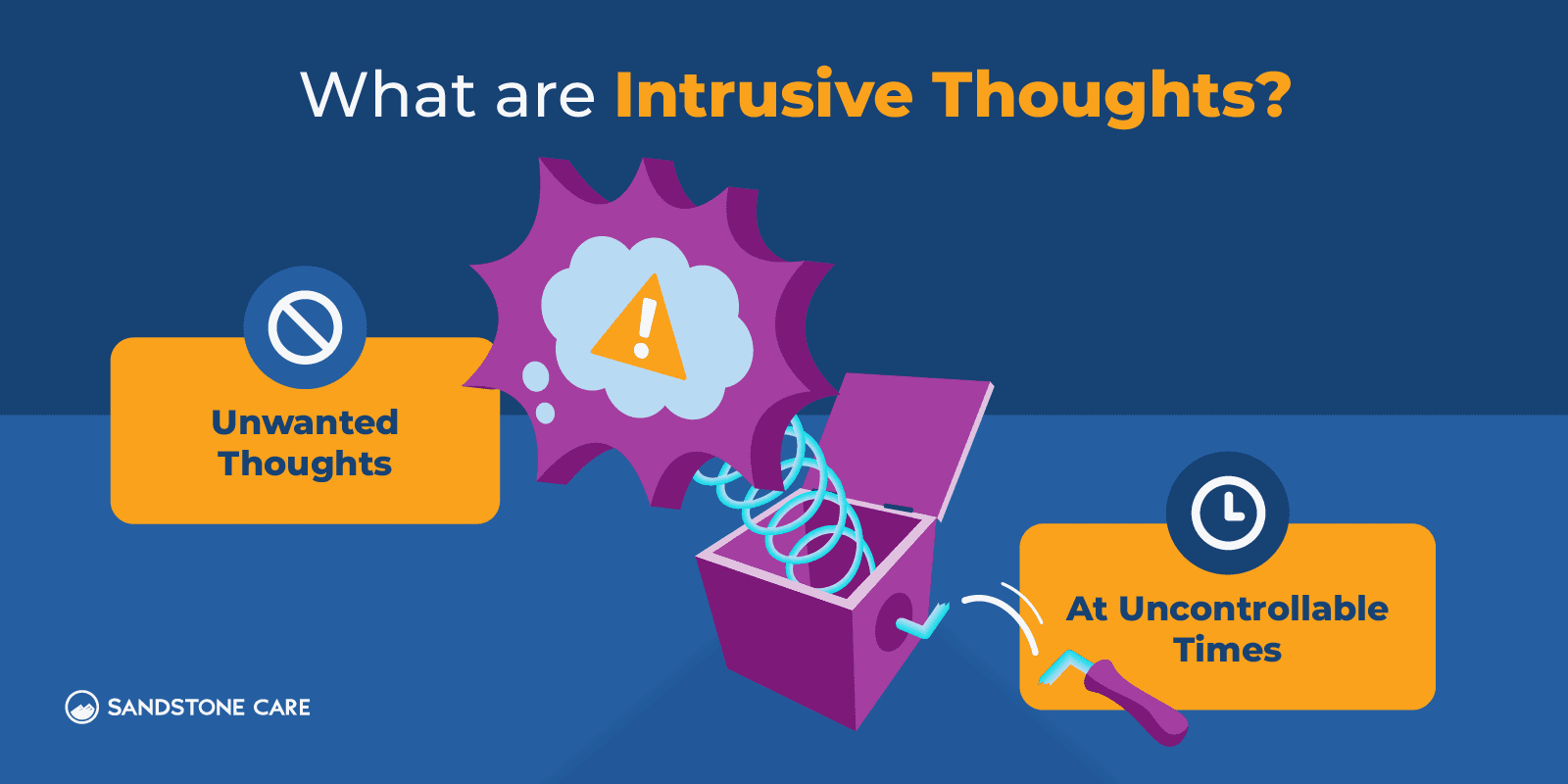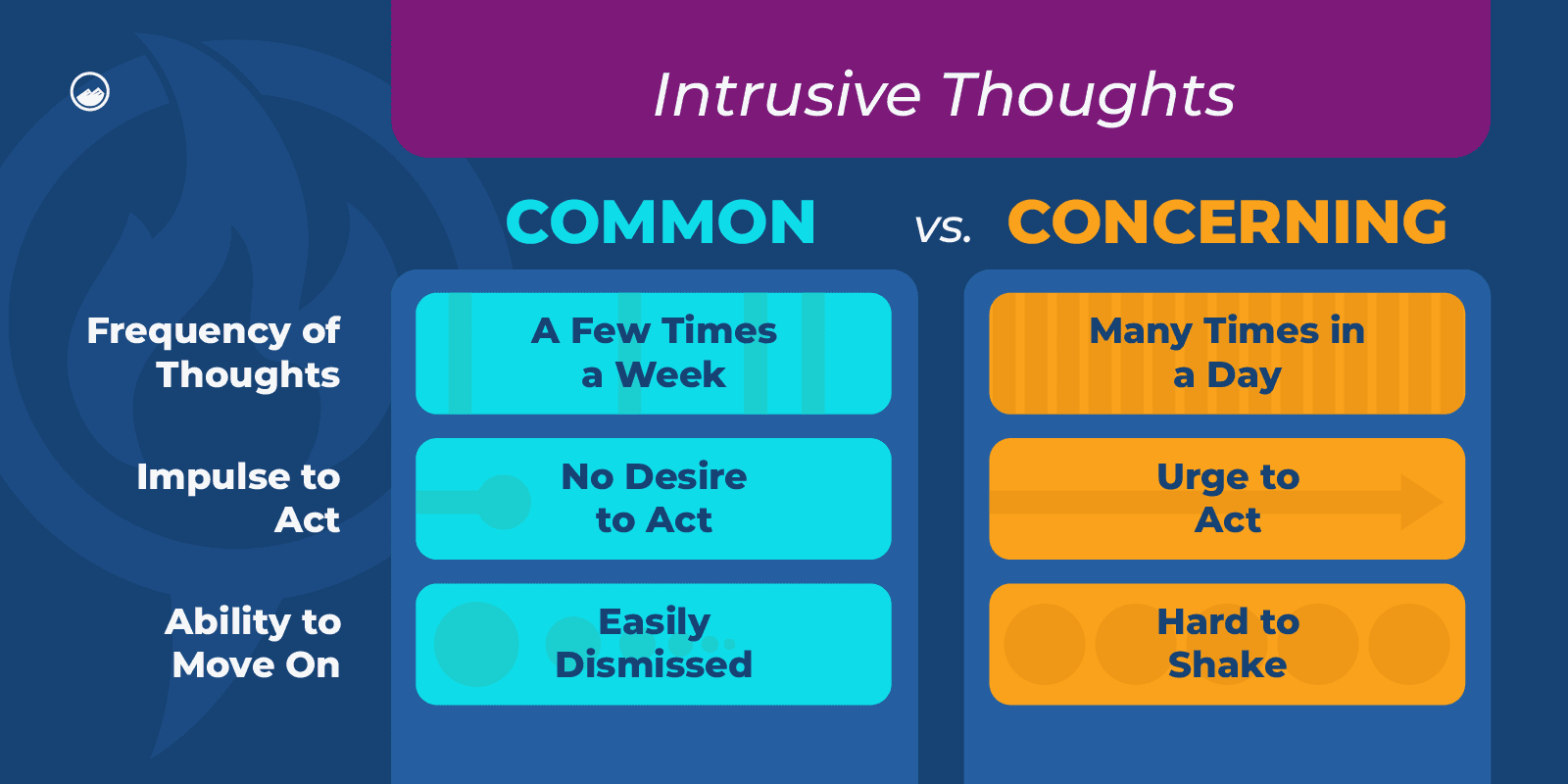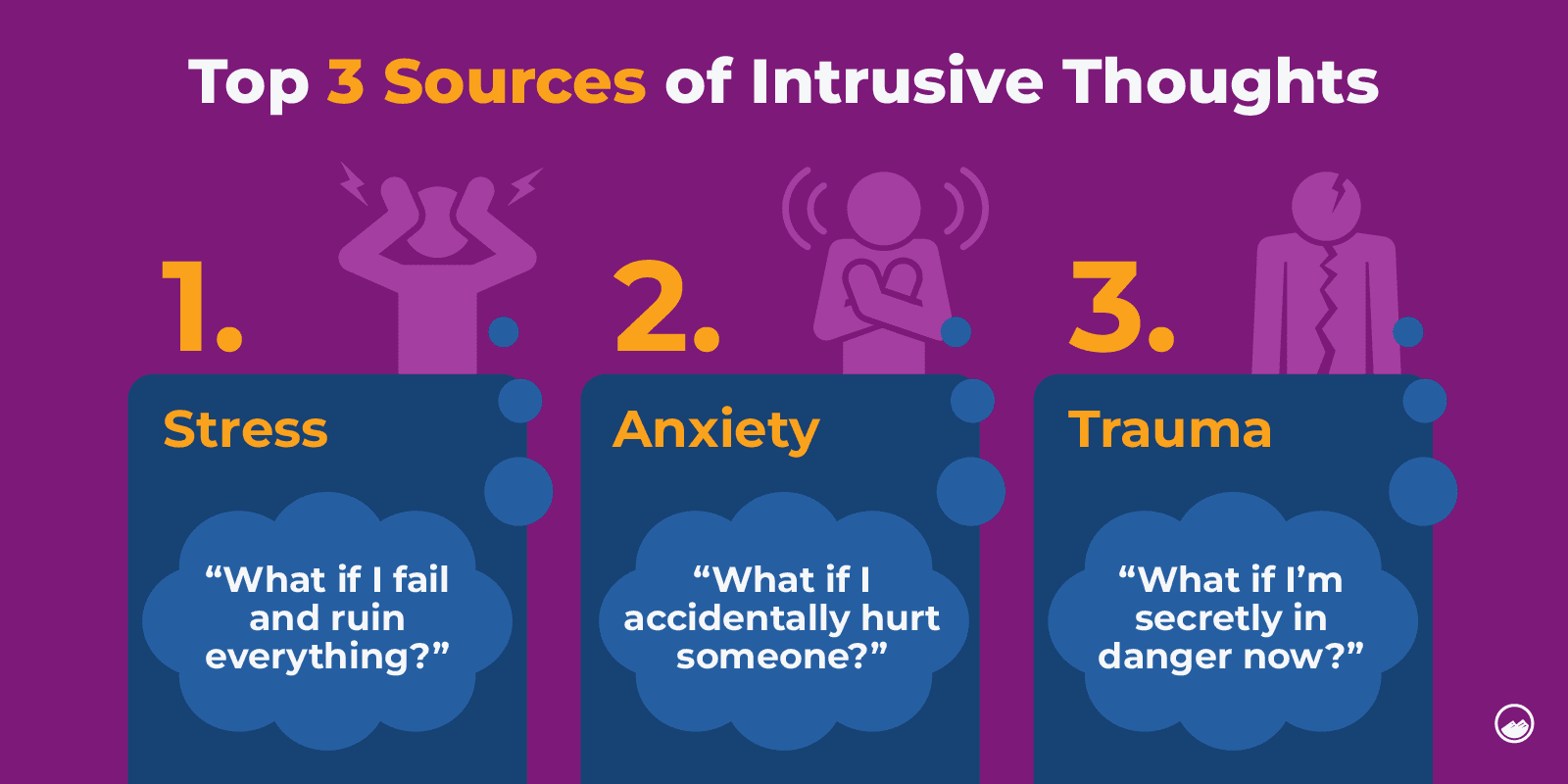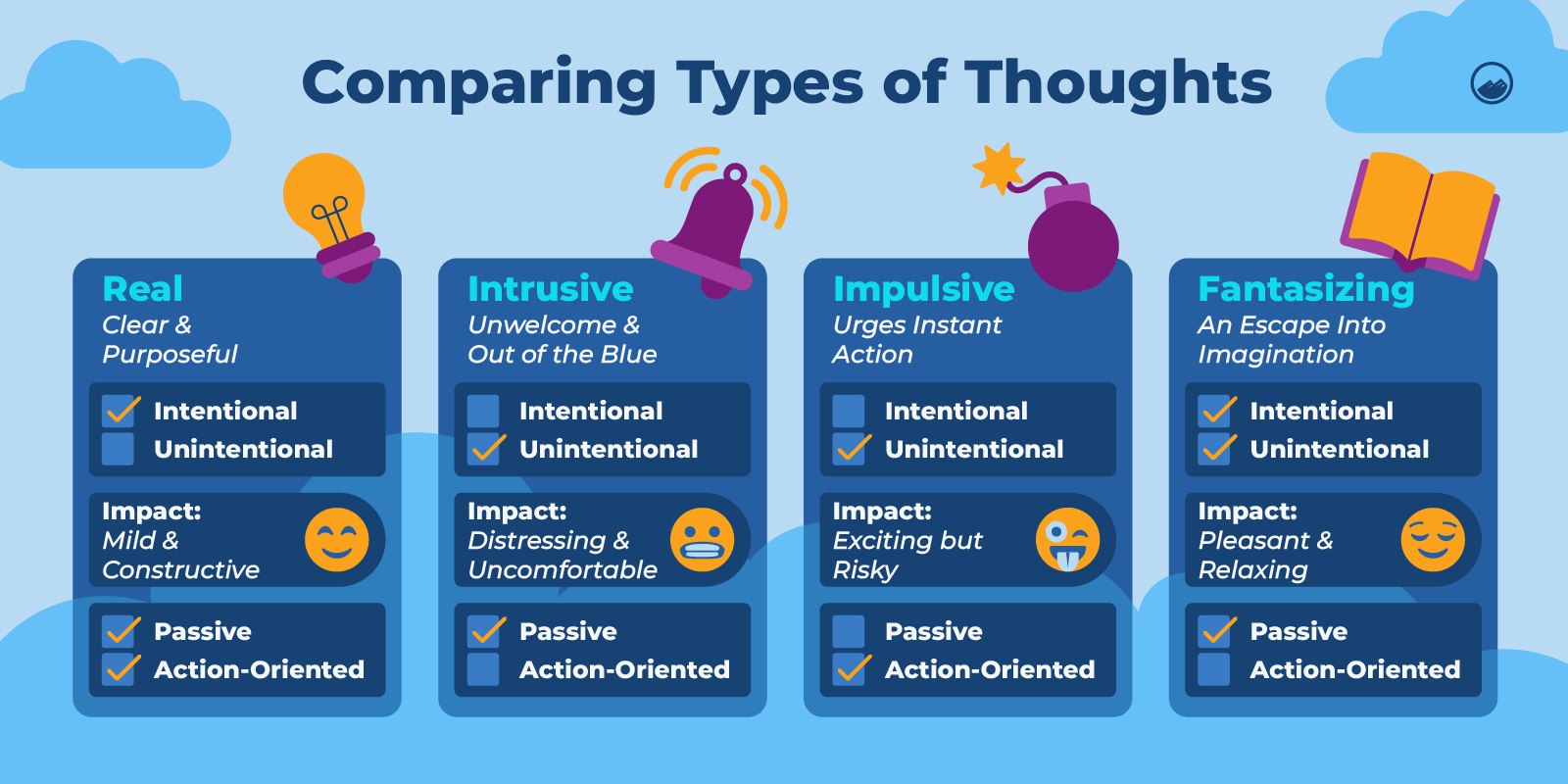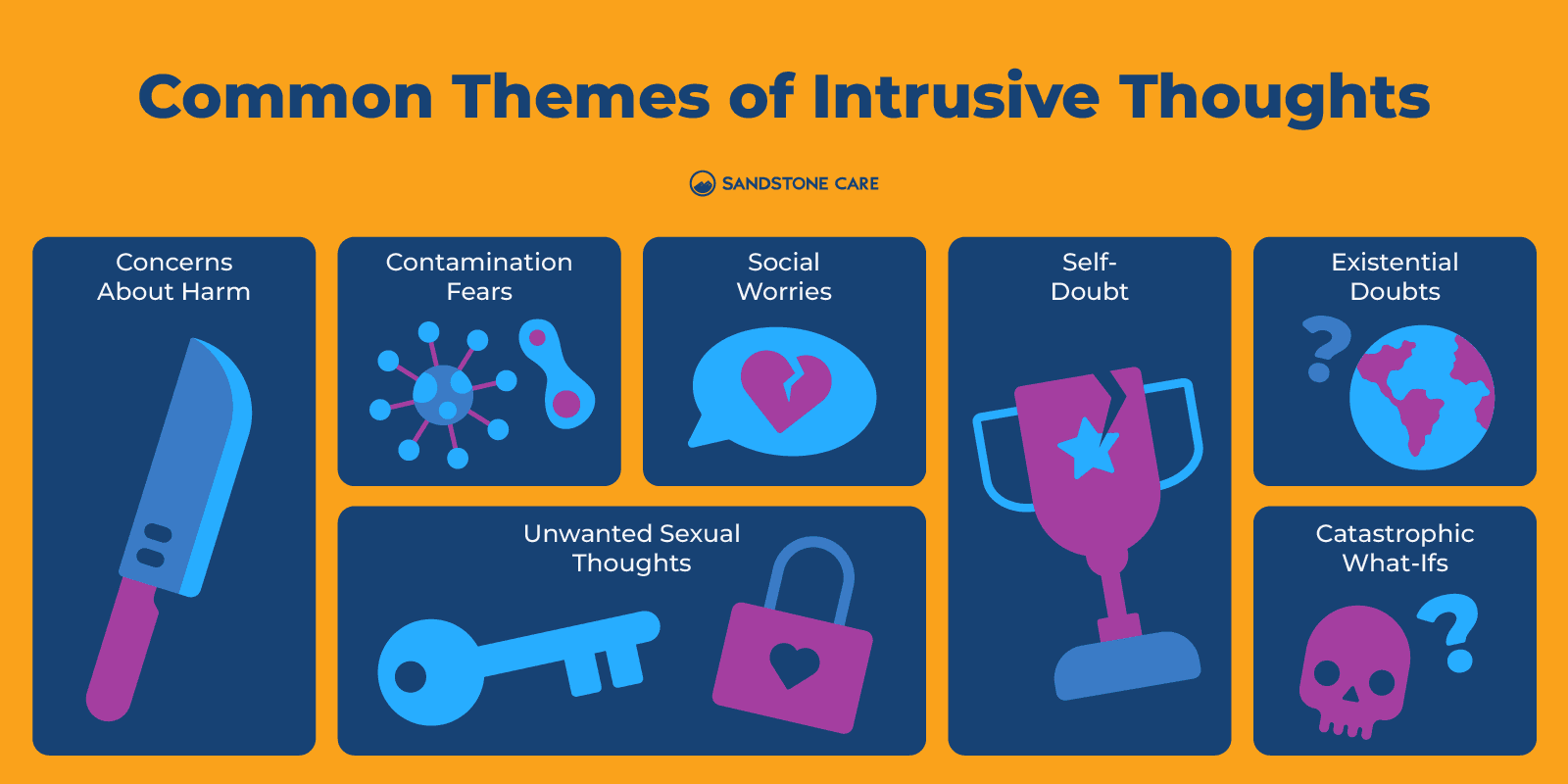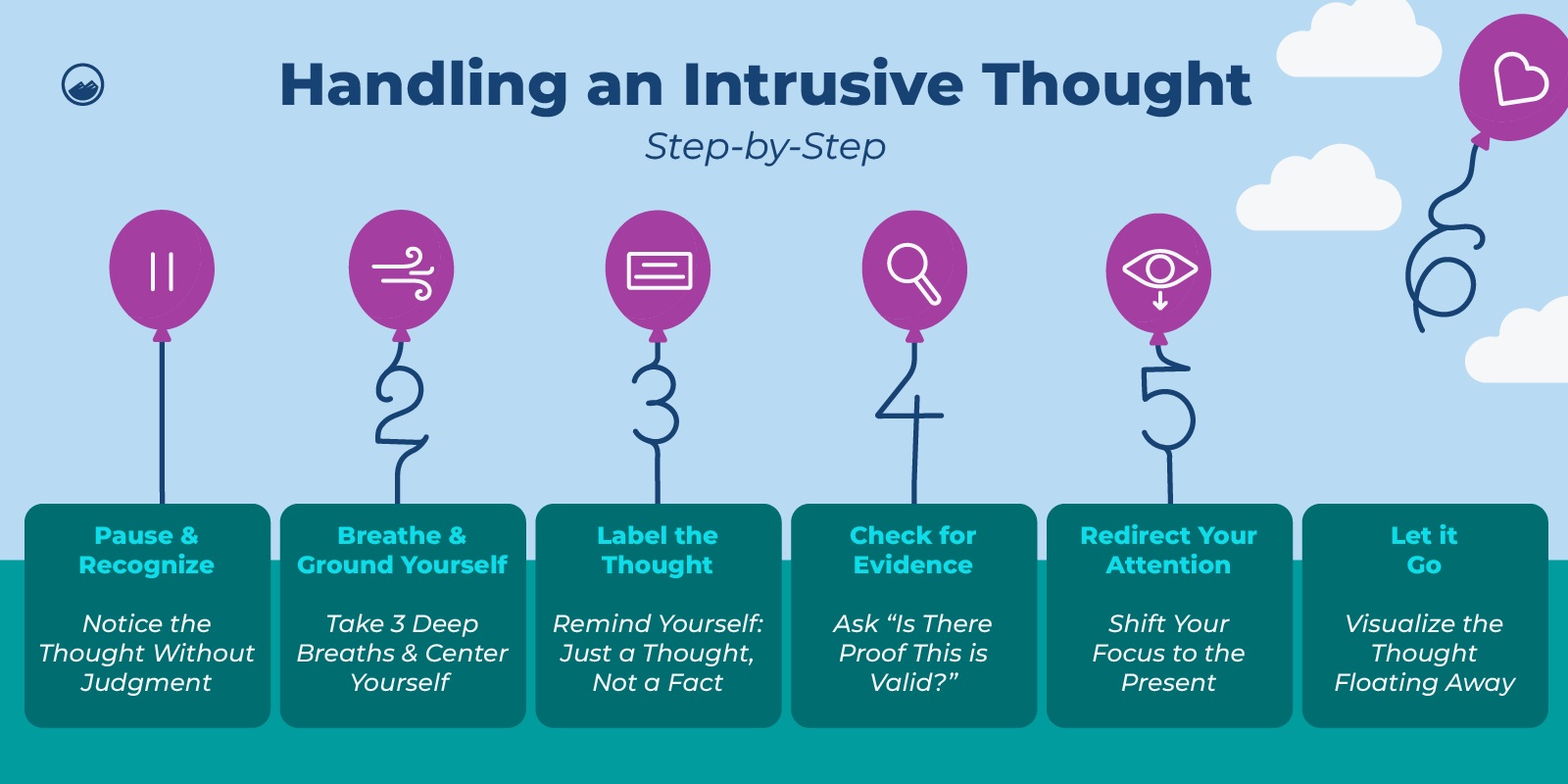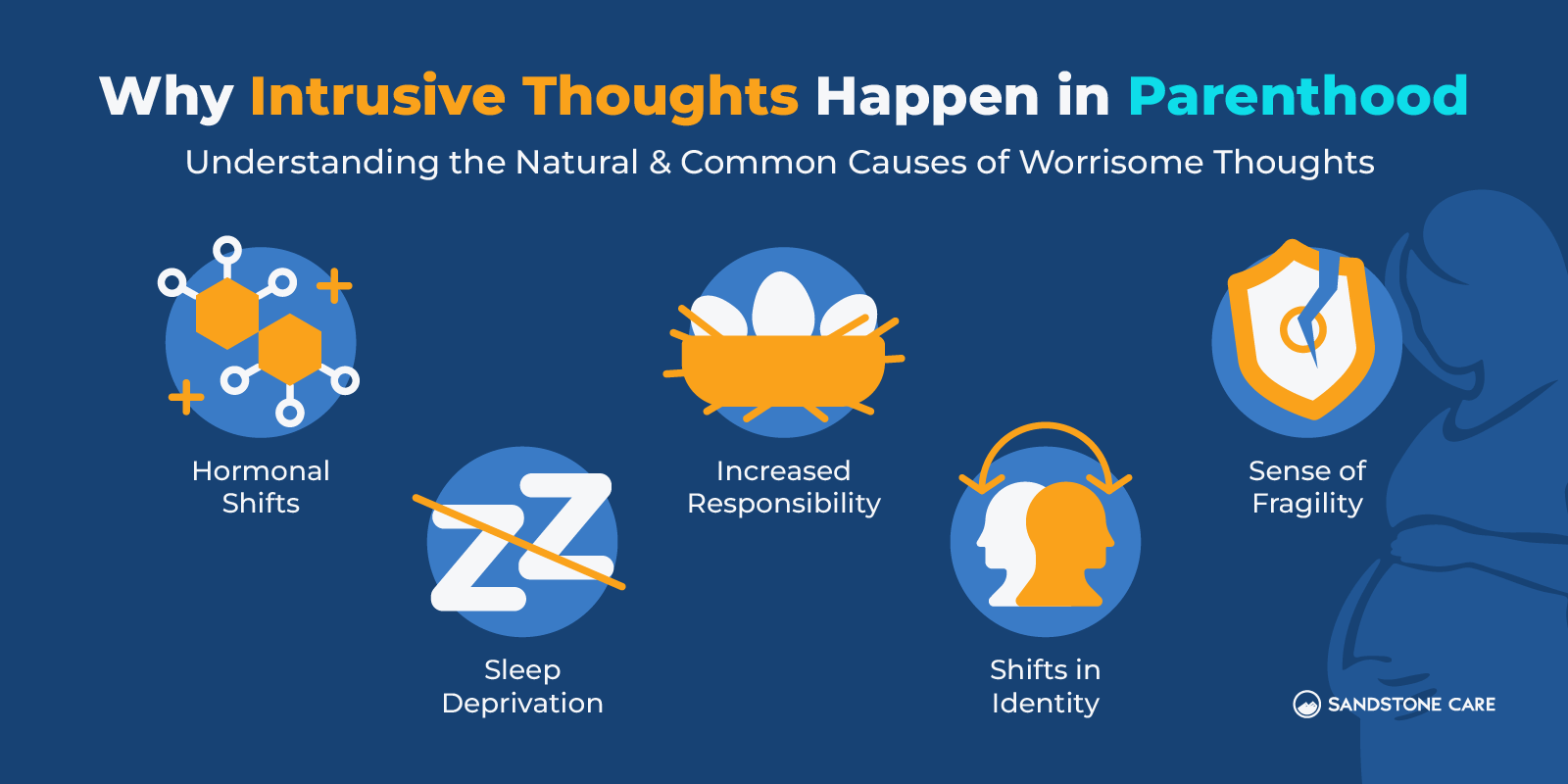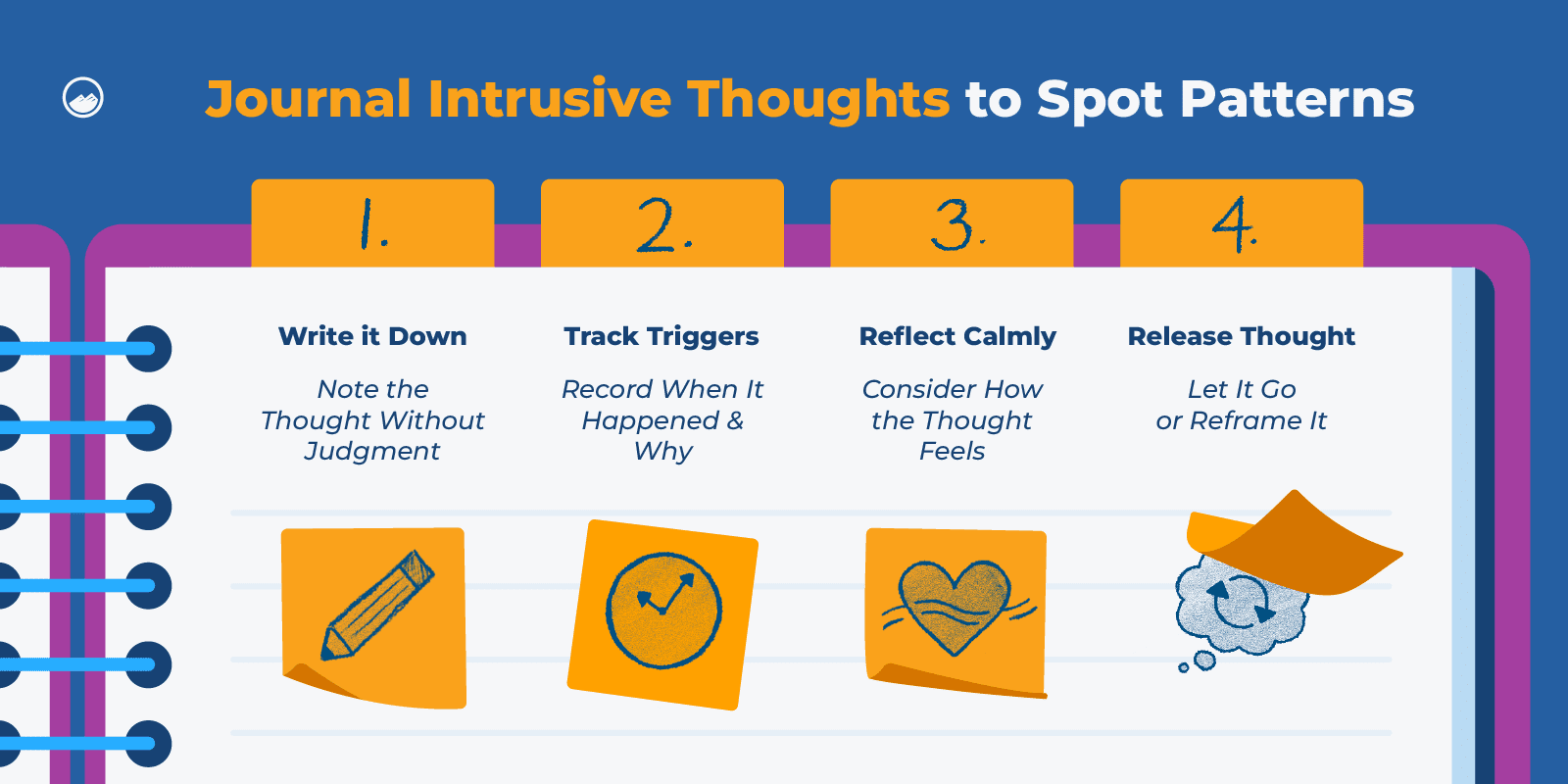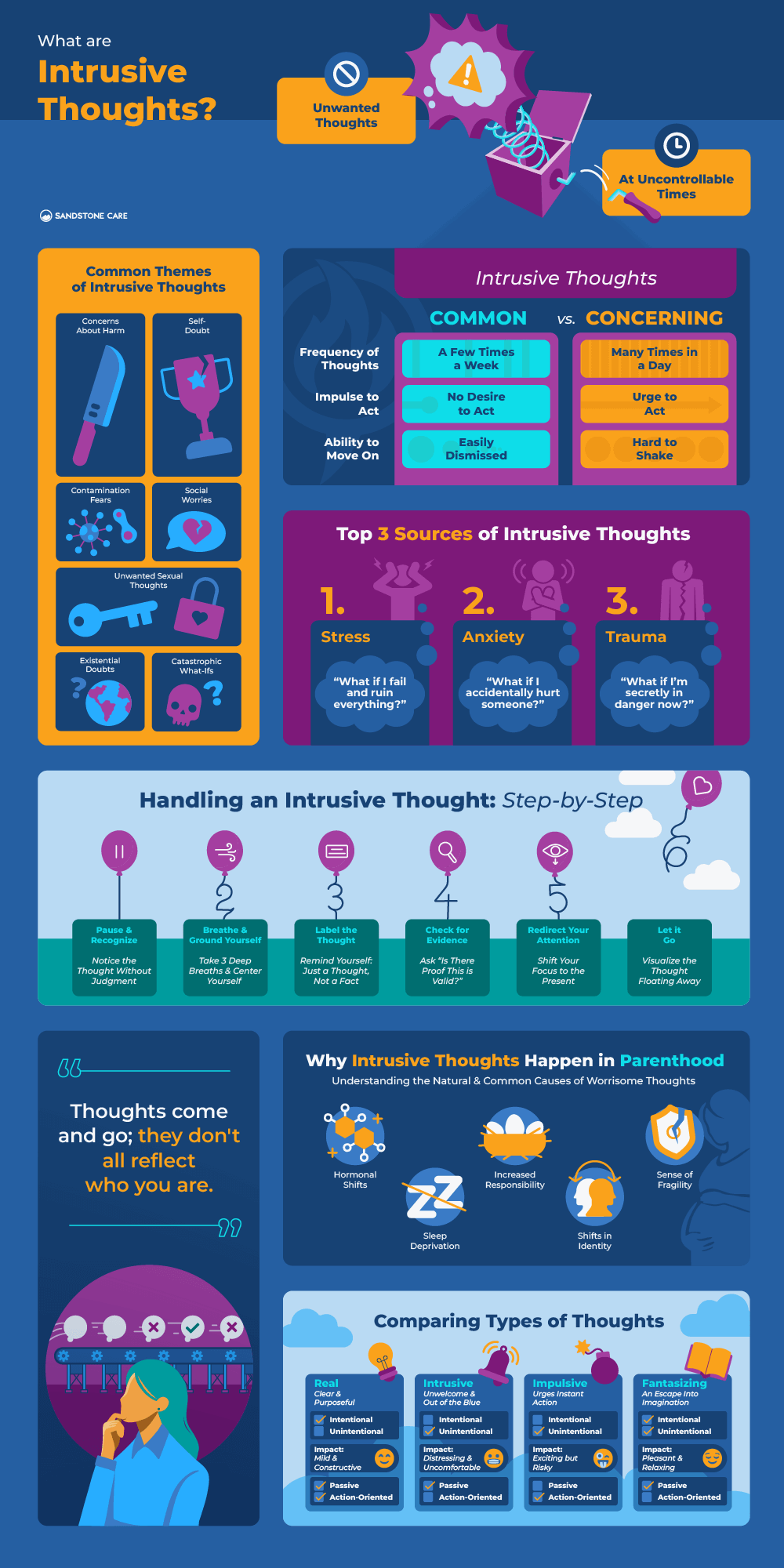Intrusive Thoughts Introduction
What Are Intrusive Thoughts?
Intrusive thoughts are unwanted thoughts, ideas, or images that come to mind unexpectedly.
These thoughts can cause distress and discomfort, and many people who experience them feel that they are alone in their experience.
However, several conditions cause intrusive thoughts, and they do not mean that the person experiencing them is bad or dangerous in any way.
FIND OUT EXACTLY WHAT YOUR INTRUSIVE THOUGHTS MEAN.
Call (888) 850-1890 to schedule your own personal mental health assessment.
Do Intrusive Thoughts Mean Anything?
Having intrusive thoughts is a common experience and does not necessarily mean anything significant about a person’s character, desires, or mental health.
Intrusive thoughts can happen to anyone, but when they occur frequently or impact a person’s daily life, it can be a sign of an underlying mental health condition.
In this case, it is best to reach out for professional help to address the underlying concern.
Are Intrusive Thoughts Normal?
Intrusive thoughts can be a normal thing that many people experience from time to time.
However, when they impact a person’s everyday life or are linked to compulsive behaviors, it can be a sign to reach out for help.
Does Everyone Have Intrusive Thoughts?
Intrusive thoughts can happen to everyone at some point in their life.
For most people, intrusive thoughts are fleeting and can be easily dismissed or ignored.
For others, the thoughts become more frequent, intense, or cause significant distress.
It’s important to understand that while the occasional presence of intrusive thoughts is normal; what differs is how a person responds to them and how much it interferes with their life.
How Long Do Intrusive Thoughts Last?
The length of time that intrusive thoughts last can vary from person to person.
Some might last a few seconds, while others continuously pop up repeatedly or over a long period of time, like months or years.
Why Are Intrusive Thoughts So Disturbing?
Intrusive thoughts are often disturbing because the brain tends to notice things that are the most alarming.
This is linked to how our minds are wired to focus on potential threats or dangers, even if they are unrealistic or irrational.
Common themes of unwanted intrusive thoughts can include violence, sexual behaviors, accidents, religious contexts, or harm.
These thoughts can be disturbing because a person might think of something they would never act on or something that involves them getting seriously hurt.
Intrusive Thoughts Causes
What Causes Intrusive Thoughts in the Brain?
Two of the most common triggers for intrusive thoughts in the brain are stress and anxiety.
However, these intrusions can be caused by a variety of different factors, such as depression, trauma, or other underlying mental health conditions.
What Makes Intrusive Thoughts Worse?
Stress can cause intrusive thoughts to pop up more often.
Worsened intrusive thoughts can also be due to lack of sleep, anxiety, or big life changes.
For example, a person who recently gave birth might experience heightened intrusive thoughts about the safety of their child.
What Are Intrusive Thoughts a Sign of?
While intrusive thoughts can be normal, they can also be a sign of:
- Anxiety disorders
- Obsessive-compulsive disorder (OCD)
- Depression
- Postpartum depression or anxiety
- Post-traumatic stress disorder (PTSD)
- Schizophrenia
- Eating disorders
- Bipolar disorder
Where Do Intrusive Thoughts Come From?
For many people, intrusive thoughts can come up randomly and may not have any meaning or real source.
For others, intrusive thoughts can stem from phobias or fears.
For example, when a person first learns how to drive, they might be afraid of an accident happening and experience intrusive thoughts about veering into oncoming traffic.
These intrusive thoughts are likely stemming from their fear that something will happen to them when they drive.
Can Intrusive Thoughts Be Triggered?
Intrusive thoughts can be triggered by stress, trauma, or anxiety.
Effective treatments will focus on learning what triggers the person may have so that they can improve their quality of life even when intrusive thoughts persist.
Can Hormone Imbalance Cause Intrusive Thoughts?
Yes. Hormones play a big role in physical health, mood regulation, emotion, and overall mental health, which can increase the chance of experiencing intrusive thoughts.
An imbalance in hormone levels can lead to heightened levels of stress or lowered moods that might trigger such thoughts.
Some people may experience increased intrusive thoughts before period cycles or during pregnancy.
Is Having Intrusive Thoughts a Mental Illness?
Having intrusive thoughts does not automatically mean you have a mental illness.
Many people experience intrusive thoughts that don’t impact their daily lives or overall health and well-being. Their intrusive thoughts just come and go.
However, intrusive thoughts can be a symptom of mental illness or a traumatic event, especially when they impact a person’s everyday life or cause a great amount of stress.
Types of Intrusive Thoughts
What’s the Difference Between Intrusive and Impulsive Thoughts?
Both intrusive and impulsive thoughts can be distressing and uncomfortable.
Intrusive thoughts are unwanted and involuntary thoughts, images, or ideas that can become obsessions.
On the other hand, impulsive thoughts are involuntary ideas or urges that can lead to impulsive, repetitive behaviors.
One of the major differences is that intrusive thoughts don’t typically lead a person to act on the thoughts, whereas impulsive thoughts often lead to impulsive behaviors.
Intrusive thoughts are also more often associated with mental health conditions such as OCD and PTSD. Impulsive behaviors are more commonly seen in mental health conditions such as Attention Deficit Hyperactivity Disorder (ADHD) and Borderline Personality Disorder (BPD).
What Is the Difference Between Intrusive Thoughts and Fantasizing?
Intrusive thoughts are involuntary and unwanted. Fantasizing can be wanted and either voluntary or involuntary.
One of the biggest differences between intrusive thoughts and fantasizing is that fantasizing can provide pleasure or happiness to a person, while intrusive thoughts are uncomfortable and often cause stress.
How to Tell the Difference Between Real and Intrusive Thoughts?
One way to determine if a thought is an intrusive thought is if it goes against your values.
If a thought comes up and you know that it is not something you believe in or would ever do, it is not real.
Sometimes, it can be hard to identify if a thought is real or an intrusive thought because you might be worried that it quietly confesses a secret desire that you have.
However, usually, if that were the case it would not be very distressing.
If the thought seems out of character and causes you anxiety, it is likely an intrusive thought, rather than a “real” thought.
Intrusive Thoughts Examples
What Are Common Intrusive Thoughts?
Common intrusive thoughts can include thoughts of:
- Doing something illegal or violent
- Doubt, such as whether or not you turned off the stove or unplugged something
- Contamination and germs
- Sexual thoughts
- Embarrassing yourself
Some people also experience intrusive thoughts about death, like fear of something happening to them or a loved one.
Can Intrusive Thoughts Be About Anything?
Intrusive thoughts can be about anything.
They are often believed to stem from fears, but they can also be completely random.
Intrusive Thoughts in Depression
What Are Common Intrusive Thoughts in Depression?
Common intrusive thoughts in depression can include:
- Negative self-talk
- Self-doubt
- Thoughts of harming oneself or others
- Fear of something happening to themselves or a loved one
- Worries about how someone thinks of you
- Feeling that you might lose control
Intrusive Thoughts Anxiety
Can Anxiety Cause Intrusive Thoughts?
Intrusive thoughts can be a symptom of anxiety or generalized anxiety disorder.
Individuals with generalized anxiety disorder experience frequent and constant worry, fear, and dread.
What Are Common Intrusive Thoughts in Anxiety?
Common intrusive thoughts that can be associated with anxiety can include:
- Thinking that something bad is going to happen to you or someone you love
- Self-doubt
- Worst-case scenarios
- Thinking about what others think of you
- Worries about getting sick or concerns about your health
ADHD Intrusive Thoughts
Can ADHD Cause Intrusive Thoughts?
Yes, ADHD is associated with symptoms of intrusive thoughts.
Many people with ADHD experience intrusive thoughts.
What Are Common Intrusive Thoughts in ADHD?
Common intrusive thoughts in ADHD can include:
- Thoughts of doing something that might harm oneself, with no intention of ever doing it and no urge actually to do it
- Thoughts of something bad happening
- Negative self-talk and self-doubt
Obsessing and rumination are common characteristics of ADHD, where negative thought patterns continue in a cycle.
OCD Intrusive Thoughts
Are Intrusive Thoughts From OCD?
OCD involves obsessions and compulsions.
Obsessions involve intrusive thoughts, images, and urges that are unwanted and that make people stressed or anxious.
What Are Common Intrusive Thoughts in OCD?
Common obsessive thoughts and intrusive thoughts in OCD can include:
- Fear of germs and/or contamination
- Aggressive thoughts or thoughts of violence towards oneself or others
- Forbidden or taboo thoughts surrounding sex, religion, or harm
- Thoughts about needing things to be perfect or in order
- Fear of losing or forgetting something
Intrusive Thoughts in Trauma and PTSD
Are Intrusive Thoughts Traumatizing?
Intrusive thoughts can be uncomfortable, distressing, upsetting, and disturbing.
Intrusive thoughts can also stem from trauma and post-traumatic stress disorder.
What Are Common Intrusive Thoughts in Trauma?
Common intrusive thoughts in trauma can include:
- Reliving traumatic experiences or things you want to forget
- Flashbacks
- Nightmares
- Fear that something will happen to you or your loved ones
- Guilt and self-doubt
What Are Postpartum Intrusive Thoughts?
It is not uncommon for people who have recently given birth to experience intrusive thoughts, specifically surrounding the health and safety of their baby.
Intrusive thoughts can also be linked to postpartum depression and anxiety.
Common intrusive thoughts after birth can include thoughts that the baby might:
- Suffocate or stop breathing
- Drown
- Get dropped or fall
Postpartum intrusive thoughts can also involve thoughts about the person as a parent; for example, they might think, “What if I don’t know how to love the baby?” or “What if the baby doesn’t love me?”
How to Stop Intrusive Thoughts
When Should I Be Worried About Intrusive Thoughts?
Intrusive thoughts can signal a need for help when they disrupt a person’s everyday life or cause a great deal of stress.
It can also be a sign to get help when intrusive thoughts occur more frequently, when they take a lot of time and energy, or when they hold you back from doing things or performing well at work, school, or at home.
Lastly, it is important to get help for intrusive thoughts if you feel like you might actually harm yourself or someone else.
What Happens if Intrusive Thoughts Are Left Untreated?
If a person is experiencing intrusive thoughts frequently and it impacts their daily life, ignoring them and leaving them untreated can worsen a person’s mental health and overall well-being.
How to Get Rid of Intrusive Thoughts Forever?
If you or a loved one are facing challenges with intrusive thoughts, getting rid of them or managing them means getting professional help to address the root cause.
How to Control Intrusive Thoughts?
While it is impossible to completely stop intrusive thoughts from ever happening, some coping skills include:
- Practice mindfulness and meditation techniques
- Practice breathing exercises
- Spend time outside
- Eat a balanced diet
- Get good rest
- Follow a routine
- Journal
- Spend quality time with loved ones
- Talk to a therapist
Do Intrusive Thoughts Go Away?
For many people, intrusive thoughts that come from time to time will just go away without much impact on their day.
However, for some people, intrusive thoughts can be a sign of an underlying problem, and if there is an underlying problem, the intrusive thoughts won’t go away unless the person addresses the root cause.
How to Help Child With Intrusive Thoughts?
Some ways to help a child with intrusive thoughts can include:
- Providing a safe and calm space where they can talk about these thoughts
- Help them learn how to accept these thoughts and not feel guilt or shame about them
- Help them learn how to change and shift their thoughts to a different focus or something positive
- Teach them mindfulness and meditation techniques
- Connect them to a mental health professional
CONNECT YOUR TEEN TO THE TREATMENT THEY NEED
Call (888) 850-1890 to begin finding the best route for healing your family.
How Do Therapists Treat Intrusive Thoughts?
One of the most common approaches therapists use is cognitive behavioral therapy (CBT) for intrusive thoughts.
Two types of cognitive behavioral therapies that may be used to help manage intrusive thoughts include exposure and response prevention (ERP) and acceptance and commitment therapy (ACT).
In exposure and response prevention, a therapist helps people face their fears and allows them to confront their obsessions and thoughts.
They provide a safe space to be exposed to them while helping them figure out what to do to manage them.
With acceptance and commitment therapy, the focus is on the individual learning to accept their thoughts and emotions and utilizing commitment and behavior change strategies along with mindfulness techniques.
Depending on the individual and where the intrusive thoughts might be coming from, a therapist might prescribe medication or suggest a different form of therapy.
Therapy is different for every individual. What works for one might not work for another.
It is important to discuss with your therapist or healthcare provider on what other treatment options you have based on you or your loved one’s needs.
Should I Tell My Therapist About My Intrusive Thoughts?
Yes. It is a good idea to tell your therapist about your intrusive thoughts so that you can get help in managing them and address any root problems.
Can Medication Stop Intrusive Thoughts?
Depending on what is causing the intrusive thoughts, medication is sometimes prescribed to help manage them.
Common medications used to help treat intrusive thoughts include antidepressants like selective serotonin reuptake inhibitors (SSRIs), which are commonly used to treat depression and other mental health disorders.


